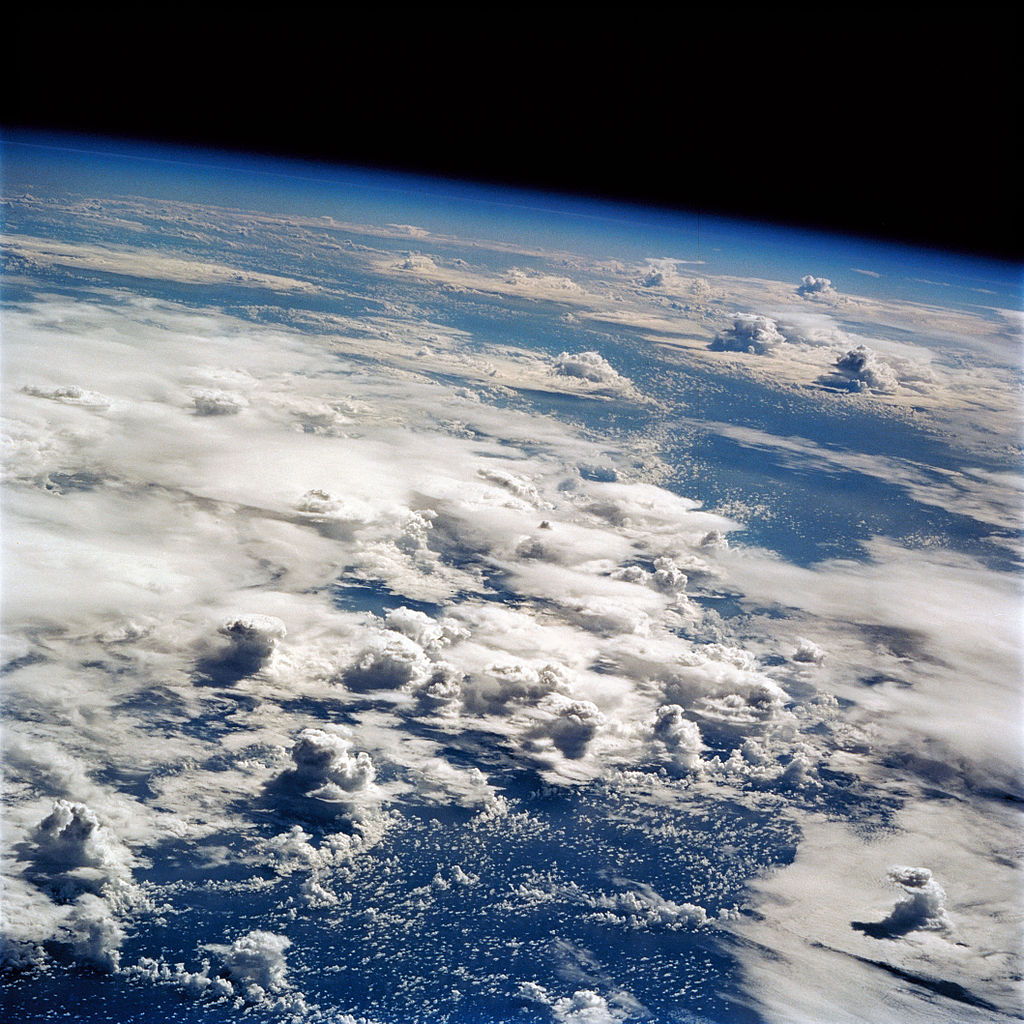The Space Shot that Made History 地球的第一張照片
( 地球村生活美語月刊2015年6月號文章)
The Hubble Space Telescope2 has clearly shown that photos shot from outside Earth’s atmosphere3 can produce amazing images of the universe. However, the first-ever4 photo taken from space showing our planet5 was shot by a German-made rocket6. That historic photo made news recently when it went up for auction1.
哈伯太空望遠鏡清楚展現了在地球大氣層外拍照,可以產生令人驚嘆的宇宙照片。然而,在外太空所拍攝的首張地球的照片,是由一座德國火箭所拍攝的。這張歷史性的照片最近被拿出來拍賣時,也上了新聞。
Jess : Did you know this photo in the newspaper is the first taken of Earth from space?
傑絲:你知道報紙上這張照片,是從外太空所拍攝的第一張地球照片嗎?
Dave : I read that the Hubble Space Telescope recently celebrated its 25th anniversary7. It has taken some of the most amazing photos of the universe, but one thing it’s not famous for is shooting pictures of Earth. And that picture is black-and-white, so I’m guessing it was shot by one of those Apollo rockets in the 1970s.
戴夫:我最近讀到哈伯太空望遠鏡慶祝了二十五歲生日。哈伯太空望遠鏡拍過一些令人讚嘆的宇宙照片,但是哈伯望遠鏡不是由於拍攝地球的照片而出名。而那張照片是黑白的,所以我猜這是由1970年代的某一座阿波羅火箭所拍攝的。
Jess : Think even earlier.
傑絲:往更早的時期猜猜吧。
Dave : But Sputnik, the first man-made Earth satellite9, didn’t have a camera. Nothing produced by humans ever orbited10 Earth before that Russian satellite did in the 1950s. Unless a later generation of Sputnik took it.
戴夫:但是第一座地球人造衛星史普尼克,並沒有配備相機啊。這座俄羅斯衛星,在1950年代環繞地球之前,從來沒有人造物品繞地球運行過啊。除非是這顆人造衛星的後代拍了這照片。
Jess : This picture wasn’t shot by anything that orbited our planet. It went up, shot a picture, and came back down.
傑絲:這張照片不是由任何環繞地球運行的物體所拍攝。照相的物體飛到外太空,拍了照片後,就回來地球了。
Dave : Sounds like a rocket, not a satellite, may have taken that photo.
戴夫:聽起來拍照的比較像是一座火箭,而不是人造衛星。
Jess : Indeed, and a German rocket of all things.
傑絲:沒錯,而且竟然是一座德國火箭。
Dave : But Germany never had a space program.
戴夫:但是德國從來沒有太空署存在啊。
Jess : The rocket in question was actually a ballistic11 missile12 built by the Nazis.
傑絲:我們在討論的這座火箭,其實是納粹建造的一支彈道飛彈。
Dave : Wow, I never would have imagined a camera was mounted13 on a missile, all the way back in the 1940s! But it kind of puts a dent in my enthusiasm2 when I hear you mention the Nazis.
戴夫:哇啊,我絕對想不到早在1940年代,就有相機被架設在一支飛彈上!但是當你提到納粹時,突然讓我的熱情略為減少。
Jess : If it makes you feel any better, American scientists took the picture.
傑絲:如果能讓你感到好些,照片其實是由美國科學家所拍攝的。
Dave : Huh? Now I’m really confused!
戴夫:什麼?現在我真的感到困惑了。
ÅVocabulary
1.shot (n.) [HAt] 照片
2.telescope (n.) [`tEl6@skop] 望遠鏡
3.atmosphere (n.) [`8tm6s@fIr] 大氣
4.first-ever (adj.) [@fRst`Ev2] 第一個
5.planet (n.) [`pl8nIt] 行星
6.rocket (n.) [`rAkIt] 飛彈;火箭
7.anniversary (n.) [@8n6`vRs6rI] 週年紀念
8.man-made (adj.) [`m8n@med] 人造的
9.satellite (n.) [`s8t4@aIt] 人造衛星
10.orbit (v.) [`OrbIt] 繞軌道運行
orbit orbited orbited
11.ballistic (adj.) [b6`lIstIk] 彈道的
12.missile (n.) [`mIs4] 飛彈;導彈
13.mount (v.) [maUnt] 架置;裝有
mount mounted mounted
Idioms, Phrases, etc.
1.go up for auction (v. phr.) 拿出來拍賣
2.put a dent in one’s enthusiasm (idiom) 讓熱沈略為減少
Jess : To tell the truth, it is pretty complicated how all this played out1. The Germans had superior1 technology when it came to missiles in WWII. Their V-2 rockets were the first man-made objects to reach beyond Earth’s atmosphere. That allowed them to travel vast distances from say, Germany to England, unlike anything that the Allies had.
傑絲:老實說,這一切是如何進行到最後的,其實相當複雜。德國人在二次世界大戰中,擁有卓越的飛彈製造技術。德國人的V-2火箭,是首樣能穿越地球大氣層的人造物體。這些導彈可以旅行遙遠的距離,例如從德國到達英國,這不同於任何盟軍所擁有的武器。
Dave : With that kind of technology, how could they have lost the war?
戴夫:德國擁有這樣的技術,怎麼會輸了戰爭呢?
Jess : Well, they may have had targeting problems that never got solved before the Allies took out Hitler.
傑絲:嗯,他們可能在盟軍制伏希特勒之前,還有尚未解決的目標瞄準問題吧。
Dave : Isn’t there some debate whether Hitler actually died or not?
戴夫:關於希特勒到底是否死亡,不是有爭議嗎?
Jess : There’s no debating which side won, however, and unused V-2s ended up in American hands after the Nazi surrender2.
傑絲:但是那一邊贏了戰爭則是無爭的事實,而納粹投降之後,這些沒被用過的V-2火箭落到了美國人手中。
Dave : So the U.S. mounted a camera on one and it took the picture. Why was it in the paper now, all these years later?
戴夫:所以美國人架設了一台相機在這支飛彈上,並且拍了這張照片。為什麼在這麼多年後,這張照片又上了新聞?
Jess : Because of its historic value2. The photo was auctioned off in London this past March. The rocket was launched from the White Sands Missile Range3 in New Mexico by the U.S. military on the 24th of October in 1946. The auctioned item was a print that its sellers claimed4 was the very first photo showing space and the curvature of the Earth3 in the same shot.
傑絲:因為這張照片的歷史重要性。今年三月這張照片在倫敦被拍賣。火箭是在1946年十月二十四號,從美國新墨西哥州的白沙導彈試驗場,由美軍所發射。被拍賣的物品是一張照片,賣家聲稱這是最早的一張展現外太空樣貌的照片,同時也拍到了地球的弧線。
Dave : I’m surprised the camera didn’t get obliterated5, since I’m assuming the rocket was just crumpled6 metal after smashing hard on the desert floor.
戴夫:我很訝異相機沒有毀壞,因為我假設火箭在重砸到沙漠上之後,應該變成了破銅爛鐵。
Jess : The rocket indeed could not be used again, and neither could the camera.
傑絲:火箭和相機確實都無法再被使用。
Dave : But that auctioned photo proves the negative7 survived the impact intact8 and was unexposed9 to light. How much was it auctioned for?
戴夫:但是這張拍賣的照片,證明了底片從衝擊中完好的保留下來,並且也沒有曝光。這張照片賣出多少錢?
Jess : It sold for the equivalent10 of US$2,089.
傑絲:賣出的價格同等於美金兩千零八十九元。
Dave : Not bad for a grainy11 print that wasn’t shot in color.
戴夫:對一張黑白的低清照片來說,這個價格還算不錯。
Jess : Living in the age of the Hubble telescope kind of spoils12 us, doesn't it?
傑絲:活在哈伯望遠鏡的時代,似乎讓我們胃口被養大了,對吧?
ÅVocabulary
1.superior (adj.) [s6`pIrI2] 較好的;上等的
2.surrender (v.) [s6`rEnd2] 投降
surrender surrendered surrendered
3.range (n.) [rendG] 試射場
4.claim (v.) [klem] 聲稱
claim claimed claimed
5.obliterate (v.) [6`blIt6@ret] 消滅
obliterate obliterated obliterated
6.crumpled (adj.) [`krVmpld] 扭曲的
7.negative (n.) [`nEg6tIv] 底片
8.intact (adj.) [In`t8kt] 完整無缺的
9.unexpose (v.) [@VnIk`spoz] 未曝光
unexpose unexposed unexposed
10.equivalent (adj.) [I`kwIv6l6nt] 相等的;等值的
11.grainy (adj.) [`grenI] 顆粒狀的
12.spoil (v.) [spOIl] 寵壞
spoil spoiled spoiled
Idioms, Phrases, etc.
1. play out (idiom) 進行到底
2. historic value (n. phr.) 歷史重要性

